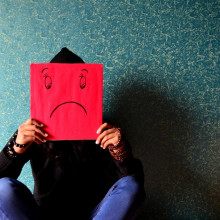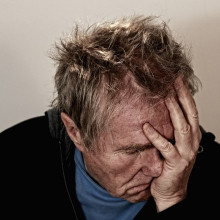Stressed? You're not the only one...
This week on the Naked Scientists, are we more prone to struggle with stress and if so why? Graihagh Jackson is probing the state of our mental health by taking a stress test to unearth how the human body responds and why; we'll be seeing whether having a 'gut feeling' has anything to do with it and what we can all do to unwind a little more.
In this episode

00:54 - Are we all getting more stressed?
Are we all getting more stressed?
with Professor Sir Cary Cooper, University of Manchester
Stress is a realitively new concept but rates have been on the rise in recent years, but why? Connie Orbach spoke to Cary Cooper about our mental health...
but why? Connie Orbach spoke to Cary Cooper about our mental health...
Cary - Well, stress has been around a long time - the concept of stress has, particularly in engineering. The construct being pressure on material things, on physical things. Where that converted to human beings probably started with Hans Selye at the University of Montreal. He's a medic and he started to talk about the stress on the human body and he used a lot of the early work by Cannon, who was an engineer, saying - hey, if there can be stress on physical objects, then there can be stress, an IC stress as he says as a clinician, on human beings.
Graihagh - That's Cary Cooper and Naked Scientist Connie Orbach, you sat down with him to unpick whether stress is becoming more commonplace or whether it's always been around and that we're just more aware of it?
Connie - yeah, this guy Selye coined the term 'stress' in humans but actually, stress isn't a new thing - humans have been stressed out for a long time but it's only in the last few decades that we have a definable construct...
Cary - It's been around a long time - the human condition. We've had environmental factors, personal factors, affecting people and their health for quite a long time. It's just that over the last few decades more research has been done on how stress affects human health. Whether it's in the workplace - one of the factors in the workplace that cause people to get stress, or in life more generally.
Connie - I seems to be reading that people are more stressed than ever before. I hear it all the time, but is that really true or is that just something we like to say?
Cary - No, I think it really is true. I mean, if you just take a look at the workplace. Musculoskeletal diseases was the main cause of sickness absence in the UK for decades. Now it is the common mental disorders of depression, anxiety, and stress. The are now the leading causes of sickness absence, not just in the UK workforce by the way, but throughout the developed world. You'll see that in the E.U., in E.U. countries, in North America, it is now the leading cause.
Graihagh - OK, I understand that in the workplace, as jobs have changed so have the reasons for sickness from physical problems to mental ones but are there actually any stats to back this up?
Connie - Well this is a slightly tricky one, as Cary said, people have only been studying stress since the 50's. So it's still a relatively new field scientifically and there haven't been many studies looking at a change in population health, but what there has been has brought in, well, I think, some alarming statistics. When asking are we getting MORE stressed, universities have reported a 10% increase in uptake of their counselling services year on year with mental health problems on campus increasing from 8,000 to 18,000 cases in just four years.
Graihagh - Wow, that's quite a lot.
Connie - Yes. I was looking for studies and I came across this one and was really quite surprised.
In terms of big numbers, in 2014 the charity, Mind (the mental health charity), found that 56% the workers they polled reported workplace stress which is a crazy amount.
Graihagh - Sorry, I'm a bit speechless - 56% is a staggering amount. But I wonder, is there a difference between stress and, you know, having a lot on your plate?
Connie - Yep. Absolutely and so when does stress become a problem and, actually this is something I asked Cary. A difference between pressure and stress
Cary - People will say I'm stressed. Basically, when they say that, just generally, they mean that they're under pressure. By the way, pressure is stimulating and motivating but when pressure exceeds your ability to cope, then you're in the stress arena and when that happens, you'll get ill health consequences.
Connie - And if we are more stressed, you mentioned that the types of jobs we're doing have changed but, also, a lot of other things have changed about the world we live in now. So what's causing this increased stress?
Cary - Well, there is a variety of things. First of all technological advance is much faster than ever before. People have been more mobile. If you think about it, 30 or 40 years ago, people worked within a radius of 30 miles of where they lived. They had the community around them, they had their extended family; we don't have the extended family anymore. We don't have the natural councillors in our environment: the aunties, the grandmas, the neighbours who knew four generations of your family, who were people you could go and talk to because people weren't mobile. But now people are looking for jobs, they're moving away from their extended family and, basically, we're now just into the mother, the father, the kids, So we don't have now the kind of support systems that we had then, and really the insecurity in society generally now. Jobs are not longer for life and we're working longer hours. If you take the UK, we have the longest hours in the developed world behind the United States.
Connie - You talked about connectivity but connectivity through technology. We are constantly switched on and constantly available. We talk about relationships but it's a very different type of relationship that, isn't it?
Cary - Yeah. What's also happening, I think, is not only the speed of technology and the constant change that we're undergoing as a major kind of outside source of stress on people, but think about information and communication technologies. Just think about email. Email is overloading people; through mobile technology it's on 7/24 and, in fact, it's interesting that many employers now are closing down their servers at the weekend because people are accessing it too often, some at night. The technology has gone so fast that we're not in control of it, it's in control of us.
Graihagh - That's quite a statement. Do you feel like technology is controlling you?
Connie - I've had a think about this and... yes. I'd rather it wasn't but I feel like slowly over time. I've tried to stop it but things have just come in more, and more, and more, until I've become the person I never wanted to be - a phone obsessed person.
Graihagh - I think it's with the invention of smartphones, actually, that you never quite switch off. There's always a social media outlook: twitter, facebook, instagram to be checking. There's emails, texts, I'm thinking instant messaging as well. You're bombarded with different types of communications because of this new technology.
Connie - Absolutely, and there's always an easier way of doing things as well. So I felt like I don't need maps I'm going to go my own way but, in the end, why don't use just use the maps on your phone, and in the in end why don't you just message someone quickly, and in the end why don't you just search for the thing you're all talking about. And then you just can't get away from it because it's always being more useful than maybe I even want.
Graihagh - But is that stressful? It sounds pretty... I mean for me certainly it seems pretty useful. I have to admit when I see 100 notifications on an instant messaging app, it does kind of freak me out but I don't think it stresses me out.
Connie - I think what that all does for me is it just makes this phone ever present by using it all the time, by always being more useful than not. I can't get away from it and try turning off my emails on my phone but then I'm like ah, I'd actually quite like to know. I know they're there. I always know they're there so I can't get away.

09:24 - Why do some people get more stressed?
Why do some people get more stressed?
with Professor Peter Kinderman, British Psychological Society and University of Liverpool
Some find an event stressful, other just feel it as pressure but why do we experience the same situation differently? Peter Kinderman believes it's to do with psychosocial factors, as he explained to Graihagh Jackson...
Peter - Well typically the conventional, I suppose, disease model of psychiatry says that when somebody is depressed, or when somebody is anxious, or when somebody has difficulties in their relationships, it stems from a flaw within the individual. But I think we know that poverty, and abuse, bullying, negative life experiences and, also, growing up in societies or within communities which are socially unequal is highly likely to lead to mental health problems.
Graihagh - Meet Peter Kinderman
Peter - Professor of Clinical Psychology at the University of Liverpool and I'm currently President of the British Psychological Society.
One of the things we know is that unequal societies are nearly always worse and equal societies are nearly always better. So, in nearly every measurable way, people growing up in unequal societies do worse. There are more social problems, such as crime and social disorder in unequal societies relative to equal societies, when you take into account the absolute wealth of the nations. Of course, wealthy countries have more material possessions so they can buy goods, they can buy hospitals, they can buy the time of police officers and so forth, they can buy roads but, given the absolute wealth of nations, those nations that are more equal, have lower levels of social disorder, higher levels of personal happiness, and lower levels of mental health problems, yes.
Graihagh - Why is this though? Because as Peter has highlighted, living in a developed country means you have access to healthcare, education and welfare...
Peter - One of the things for me as a psychologist that comes across is that the phenomenon of social comparisons seems to be very important. What human beings seem to do is they don't necessarily seem to sit down and think in some objective terms, how is my life going. They compare themselves to other people. We're inherently social animals so our sense of who we are, and how we're doing, and our sense of optimism for the future seems to be implicitly tied in with how we're doing compared to other people, or how we're doing compared to how we should be doing.
Graihagh - Is that necessarily a bad thing?
Peter - Well I was talking about this with a colleague and we were talking about how wonderful little animals human beings are and how we strive to improve our living conditions by manipulating our environment. So we were sort of speculating about how it's difficult for human beings to feel satisfied because we're driven to always improve. And you could imagine how it would be evolutionarily extremely advantageous to humans to sit around after a hunting gathering expedition, eating fruits and vegetables, and then think I wonder if we could do things a little differently, and if you were going to do things differently, you have to recognise that there's something imperfect about the situation that you see yourself in. So out of that comes a sort of striving, which is good, and I think that makes us supremely creative but I guess there's always the danger of it leading to some negative emotions as well.
Graihagh - Like what?
Peter - There's a danger of thinking it's not right, it's not good. And I think if we do that too much, if we do that to excess, if we only spot the negatives, then I think we can become either anxious or depressed or have other sorts of psychological problems. And then you've got to think of why. I think it's because when you grow up in straight and social circumstances, when terrible things happen to you or when you grow up in unequal societies, it has an impact on the sense that you make of who you are, what your chances in life are, whether you are a person who can command respect, and make positive changes in the world. And if you conclude, quite reasonably, on the basis of your experience in life that the chances that you have in life are a little bit limited, that's a profoundly depressing, profoundly disempowering experience.

13:45 - The ultimate stress test
The ultimate stress test
with Professor Angela Clow, University of Westminster
How does your body react when you're feeling stressed? Graihagh did a 'stress  test' with Angela Clow to find out...
test' with Angela Clow to find out...
Nina - So this is our labs for the Psychology Department.
Hello. I'm Nina Smythe and I'm a lecturer at the University of Westminster in the Psychology Department and today I'm going to be taking you through what the trio social stress test is. It involves you to give a public speech in front of a committee (two members) and you'll be asked to do a speech about a job position.
So if you're happy just sign and date it... I need you to collect a saliva sample. This will give us the baseline measure of cortisol...
Graihagh - Just chew it?
Nina - Yes just until it's wet with your saliva.
Graihagh - Mmm I wish I'd drunk a bit of water now!
Nina - OK. So I'm going to take you into the other room.
Graihagh - In the other room were two quite stern and, if I'm honest, intimidating looking people, dressed in white lab coats. The man, who I later learnt was called Frank, didn't look up when I entered the room and the women, Angela, stared down her spectacles at me. I was told there was a camera recording my every move and to commence my speech about why I would make an excellent assistant psychologist, despite having never studied psychology....
Graihagh - So my name is Graihagh Jackson and you may be wondering why someone who has a background in radio is applying for an assistant psychologists job. Well first of all...
As expected, it was hard. Neither made eye contact with me. They offered me no empathy - no smiles or nods of encouragement - they were completely blank. Here's Angela Clow...
Angela - We showed no empathy towards your condition, we had blank faces and we were powerful people. We were sitting down, you were standing up exposed. We had our symbols of power, our white coat, and we were there to make you feel little.
Graihagh - And I did indeed feel little and actually extremely anxious, despite knowing it was a stress test. I found myself fiddling with my necklace, wringing my hands and stuttering....
Graihagh - And um, and um, um...
Angela - Well this stress test has been trialled throughout the world, it's the gold standard of how to make people feel vulnerable and to threaten their self-esteem. Because you're very confident actually and the nature of your life as a communicator, you were able to display your discomfort by being outward, and energetic, and laughing, and trying your best. Some people find it extremely intimidating and they rather clam up and they hardly say anything, and I have to keep saying you have time remaining, please continue and they just look at you blankly and, to be quite honest, some people are upset.
Graihagh - Upset is something I can seriously relate to but for me, the worst was yet to come...
Frank - We're now going to ask you to perform a mental arithmetic task which will last five minutes. Your task is to serially subtract the number 13 from a number that I will give you.
Graihagh - Okay.
Frank - If you make a mistake I will tell you and ask to begin from the beginning, from the start number.
Graihagh - Okay.
This - for me - was worse than the public speaking... Because, well public speaking, I do this in my day job in some capacity - maths on the other hand, hmm, not so much...
Frank - Your start number is 2,083 please begin...
Graihagh - So, 2083, 2070,
And after I got it wrong once, my confidence plummeted. Even listening to this makes me feel stressed.
Frank - Wrong!
Graihagh - Oh gosh. Er... 80... 78...
Frank - Wrong! Please begin again with 2,083.
... and so it continued like this for a very long 5 minutes.
Nina - How was it?
Graihagh - Terrifying but I kind of knew it was going to be terrifying.
Nina - OK, so what we'll do now is...
Graihagh - I want to know if I got the job!
Nina - I thought you did very well. We'll collect two saliva samples - one in ten minutes and one in twenty minutes.
Graihagh - Hi Angela.
Angela - Time to debrief. Nice to meet you. Sorry what a horrible way to introduce myself!
Graighah - Turns out, in real life, Angela and Frank are surprisingly really nice! I was debriefed over of cup of tea with Angela and she talked me through what was going on in my body to elicit that kind of response.
Angela - OK. As soon as you walk in the room that would have started the process. There were three stress response systems: immediately your sympathetic nervous system, your arousal nervous system will start your heart pumping, and your adrenalin will start to be released. But also you'll kick in, because it's such a severe psychosocial stressor it will activate the third, like the top gear of stress responding, that's what we call the hypothalamic pituitary adrenal axis for those who want to know these things and it secretes the hormone cortisol. It takes about 15-20-30 minutes for the cortisol levels, which are activated as soon as you walk in and then start to be pumped out throughout the 10 minutes and then we can pick it up about 20 minutes after the end of the stressor.
Graihagh - So where does the saliva come into this because you made me chew lots of cotton wool throughout this test and afterwards so why did you make me do that?
Angela - Well, actually, this has been a revolution in psychophysiology, which is what we do, the combination of psychology and physiology. So, we can measure this hormone in saliva samples, and in that you have a valid reflection of the biologically active cortisol in the blood, right, and that gives us an opportunity to look at the dynamics of change of cortisol over a period of time.
Graihagh - Now you mentioned cortisol before. Can you tell me what is that and why are you so interested in it?
Angela - Oh well, cortisol is endlessly fascinating. It is a hormone - it is essential for life, so cortisol is not bad for you, you cannot live without cortisol. So cortisol is fundamental for life, it's got lots of roles where it regulates biological process. Things that you're not aware of, so cortisol is doing a job that we're not aware of and it's keeping us fit and healthy. However, in addition to that role, we call it a housekeeping role looking after our body, it's also the stress response system, so it's got two roles. So you can see if it's such a vital, if it gets abused by being secreted over, and over again incessantly, then those vital roles that it normally looks after become compromised because there's too much cortisol going on at the wrong time, etc., etc.
Graihagh - If we plotted, let's say, on the horizontal axis and the amount of cortisol on the vertical axis, what does that graph look like?
Angela - I'm so pleased you pointed that out because the way that cortisol executes its housekeeping role is by changing concentrations over the day. It's got a direct hotline to the body's biological clock and so, at night when we're asleep, cortisol levels are really nice and low so you can snooze away and in the hours before you wake up, it gradually increases as your brain's beginning to activate. And then when you wake up, for me this is the most fascinating part, there's a tipping point where you get this sudden surge in cortisol, and you get a doubling in concentration within 15-20-30 minutes. It's called the cortisol awakening response and then after that peak, about 30 minutes after you've woken up, it tracks down gradually over the day till the evening.
Graihagh - I'm intrigued to see what my results are because I've chewed four bits of cotton wool now and you've got my measurements...
Angela - I'm very intrigued to see them as well and it's going to be fascinating to see how stressed you are. You didn't look at all stressed when you were doing this job interview aspect but, I have to say, you did look under pressure when we put you through the mental arithmetic task.
Graihagh - When can I come back - when can I get the results?
Angela - Well, we're hoping to run your saliva samples this afternoon. We'll put them through the express mode and so I'd like to speak you on Thursday, and then we can talk about how you did.
Graihagh - Two days later, I went back to see Professor Angela Clow to get my results...
Angela - Well the results are in, as they say. And you started off with beautiful low cortisol so, obviously, you're journey here to London hadn't really stressed you out. You were in a nice relaxed state when you came in.
Then we took a sample immediately before you came into the room and were confronted by Frank and myself and then we took one immediately after the end of the stressor, which was ten minutes and, already, your cortisol levels had started to go up.
Ten minutes after that, it's gone up, it's about double, and then ten minutes after that at the peak you are up 25% again. So we've got a change from 3 nano mls per litre at base to 11 nano mls per litre, so quite a substantial rise. We succeeded in stressing you.
Graihagh - In this particular instant, we'd just see a sort of blip up in the timeline and then slowly go back down to normal. But, I imagine if you're continually stressed, that graph becomes very jagged with lots of bursts of cortisol.
Angela - Absolutely. You've got an underlying drive for cortisol secretion across the day which peaks in the morning and goes down over the day, and superimposed upon that you have these stress responses which are brought about by real life events. I should emphasise that people are very resilient in the short term, but if these are going on for years at a time and you're constantly exposed to these stresses across your day, then the impact of that is that it affects the regulation of your underlying pattern so that your body is less able to produce those nice dynamic changes and you end up a flat pattern across the day.
Graihagh - Why is that - what is the effect? Is it that your cells become resistant cortisol, much like when people have diabetes you become resistant to insulin?
Angela - That's exactly what happens because you become overflooded with the hormone and, therefore, the body downregulates its ability to detect it and, therefore you become less efficient at shutting it down.
Graihagh - What's the implications of that?
Angela - First of all your cortisol is your master hormone regulating downstream biological processes like your immune system, cardiovascular system, metabolic system and so, if that message isn't giving clear instructions about day and night to those biological processes, then they're not going to function properly.
Also, there are implications for inflammation - I mentioned the immune system but modern research is demonstrating that a lot of conditions are associated with inflammatory processes across the body. If you're flooding your body with cortisol at inappropriate times of day, the inflammatory immune cells, which should normally be shut off by cortisol, also become desensitised to cortisol so it promotes the inflammatory process.
We know that high inflammatory processes are associated with such a wide range of ill health conditions, for example, clinical depression is associated with inflammatory processes. As well as Alzheimer's disease and a range of cardiovascular diseases. So many things have inflammatory processes at their root really.
Graihagh - Yes, absolutely. I find that kind of shocking that stress over the long term can have such physical and, also, huge effects on your mental health as well.
Angela - Well that's why it's so interesting to study and, depending on what your biological vulnerability is, then chronic stress will be associated with a different range of conditions, that's why there's not a single stress condition. It would be so much easier for people like me is if you just end up with a big spot on your face and you say, oh you're just suffering from stress. But it's not like that because stress can manifest in a hundred different ways.

26:47 - Could your gut bugs change your mind?
Could your gut bugs change your mind?
with Professor Graham Rook, UCL
Emerging research suggests that the bacteria in your stomach could be influencing your mood, as Emma Sackville found out when she spoke to Graham Rook...
Graham - It's as though the stress resilience of the people in the rich western countries has been decreasing with time. And in fact, there's good evidence that if your immune system doesn't switch itself completely when not required, then the inflammatory responses that are chuntering along there in the background lead to changes in your brain, and lead to depression. So, it looks as though if your background activity of your immune system doesn't switch off completely when you don't need it, then your stress resilience is reduced. You are more likely to suffer bad consequences of being stressed.
The immune system is rather like the brain. It has to learn, it has to have the appropriate educational inputs put into it, especially during the first two or three years of life. Now what we think is happening in the developed, rich countries is that the control mechanisms that switch off the immune system when it's not required are not being properly educated in the early years of life.
Graihagh - What does he mean when he says our immune systems aren't being educated in the early years of life - I don't quite get it?
Emma - It's what Graham calls the 'old friends' hypothesis - it's also sometimes known as the hygiene hypothesis. This is the idea that kids aren't exposed to microorganisms anymore like our ancestors were and this suppresses the natural development of our immune system.
Graihagh - Ah ok I see where you're going with this because before, Angela said that stress reduces our ability to inhibit inflammation and inflammation is all to do with the immune system, right?
Emma - Yeah, so the scientists were wondering what would happen if they reintroduced these 'old friends'. In particular, they were interested in one particular microorganism found in soil called Mycobacterium vaccae...
Graham - Now what we've done in these experiments is use a microorganism which we know switches on certain cells that regulate the immune system. They're like the police force of the immune system and they're called regulatory T cells, and it increases the number and activity of these cells, and increases the release of mediators that are anti-inflammatory. And it turns out that by giving this organism to theses animals, when they were then exposed to as stress, it blocked the development of anxiety, it blocked the development of the coelitus and it stabilised, to some extent, the changes that stress causes in the gut.
Emma - What's interesting about this is that it may no just make us more resilient to stress but might also help dampen down the effects of stress. Graham was working with a team from University of Colorado, and they found that mice immunized with this bacteria were also protected against colon inflammation and anxiety - side effects of stress.
Graihagh - I still find this slightly bonkers that one bit of bacteria found in soil of all places can have such a huge impact... Next question - this is in mice, so how do we know this is going to a) work in humans and b) be safe?
Emma - Great minds think alike, as I also wondered this and it turns out there was a previous trial where they looked at it to try and help treat cancer...
Graham - This material has indeed been used in humans before and that was one of the reasons for using it in these animal experiments because that should make it easier to move back to human clinical trials. The point being it was used in a clinical trial for a condition where, in fact, it didn't help the condition that was being treated. That aspect of the trial failed, but the patients had been subjected to a quality of life questionnaire and although this has to be regarded as very preliminary data, it did appear to be making it easier for them to put up with the stress of the condition itself.
Graihagh - Let me guess, next step is human trials?
Emma - Yeah but it's not quite that simple...
Graham - Well, you're really looking way into the future now. Since the material is available in what is called good manufacturing practice, that is to say manufactured to the regulatory level required for trial in humans, then it should be possible, with appropriate funding, to do some such study. Designing the ideal study is very difficult. Clinical trials are extremely difficult to do well, particularly when one's looking at an end point which is something a little bit nebulous like the extent of the detrimental effects of stress.

32:55 - Coping with stress by LOL
Coping with stress by LOL
with Dr Sophie Scott, UCL
Could laughter really be the best medicine? Quite possibly, as Sophie Scott  explained to Graihagh Jackson...
explained to Graihagh Jackson...
Sophie - You do after you've been laughing get a decrease in adrenaline levels and also decreases in cortisol levels, which does suggest that your are more relaxed. You're feeling less stressed after you've been laughing.
Graihagh - This is Sophie Scott from UCL and she's done a lot of research into laughter...
Sophie - Laughter's more like a different way of breathing than it is anything else. So what happens when you're laughing is the intercostal muscles, which is the muscle between your ribs, start to move in large contractions and they just squeeze air out of you. Now normally you use those muscles to control what's called metabolic breathing, so you're doing that all the time, that's what keeps you alive. You use those same muscles to speak, so as soon as you start talking you use the intercostal muscles to very finely control the flow of air out through your larynx. If I keep talking without another breath my intercostal muscles start to have to work really, really hard to get the air out, squeeze the air out and in the end I'll run out of air altogether.
As soon as you start laughing you lose the control of the intercostal muscles that lets you breath and lets you talk and, in fact, because one of the main jobs that you're doing with your breathing when you're speaking is actually controlling how you pass air through your larynx, so how you're making a sound in your voice box. Very often, the first thing you can pick up when someone's talking and starting to laugh is this loss of control of the pitch of the voice, and very often the pitch of the voice starts to shoot up because you're starting to squeeze air out under much higher pressures than you would ever do when you were speaking normally.
So this is an example of the Radio 4 broadcaster Charlotte Green who's introducing a piece on the Today programme about a very early discovery of recorded sound and then she goes on to talk about somebody quite famous who's died. And in the interim when they're listening to this very early example of recorded sound, someone who's in the studio with her makes a joke about what it sounds like. So you'll hear what happens to her voice when she comes back to try to talk about the death of a screenwriter.
Charlotte - American historians have discovered what they think is the earliest recording of a human voice made on a device which scratched sound waves onto paper blackened by smoke. It was made in 1860, 17 years before Thomas Edison first demonstrated the gramophone and featured an excerpt from a French song "Clair de Lune"...
The award winning screenwriter Abby Mann has died at age 80. He won an academy award in 1961 for Judgement at Nuremberg. Excuse me sorry... Abby Mann also won several Emmys including... including one in 1973 for a ... for a film which featured a .... police detective called... A character on whom a long running TV series was eventually based.
Graihagh - Ah that's such a great clip.
Sophie - It's kind of beautiful isn't it? She's desperately trying to keep going. I think that's one of the things that enjoyable about it, she's on live radio - she's got to keep talking and her voice is just going everywhere. We don't really understand how that happens. There's something about the neural changes that happen when you start laughing that means it does overwhelm speaking and it does overwhelm breathing, and even if you do not want to laugh aloud you start making all these funny noises.
Graihagh - So beyond just those contractions of those muscles, what sort of effect does that have on the rest of our body?
Sophie - There's evidence for a range of changes in terms of the biochemistry of the body. So you do, after you've been laughing, immediately get a change in the body's uptake in naturally circulating endorphins so you get a measurable change in pain thresholds after you've been laughing. That looks like it's more to do with the work you're doing at your rib cage than it is anything specifically to do with laughing because you get the same change in endorphin take up if you do any kind of exercise, you'd get a change in pain thresholds, so that may not be laughter specific. You also get, over slightly longer timescales, a decrease in adrenaline levels and also decreases in cortisol levels, which does suggest that you're more relaxed, you're feeling less stressed after you've been laughing, and that might be more specific to laughter.
Graihagh - Does that mean we should all be laughing? You look like you're about to laugh yourself! Does that mean we should all be laughing more?
Sophie - I think it's certainly... we should let ourselves laugh. We should definitely let ourselves go to places and situations where we laugh because we tend to think it's a bit of a trivial, silly behaviour. And there's very little research into it scientifically compared to emotions like fear and disgust because it does sort of feel a bit silly to do this. We don't often let ourselves take our laughter seriously but, actually, I think we should consider it to be an important aspect of our lives that we should give a bit of space to.
Graihagh - Where do we laugh the most? I'm thinking of if we want to give more space to our laughter, what should we be pursuing or going out to do that will invoke laughter?
S - It is quite interesting because if you ask humans and Robert Provine has shown this. If you ask human beings (adults) where do you laugh, what do you laugh at, they'll talk about jokes, and humour, and comedy. But, actually, we laugh most when we're with other people, so it's a behaviour that's primed just by other people being there. You're 30 times more likely to laugh if there's somebody else there than if you're on your own. And that means, in practice, most of the laughter that you encounter naturally is when you're talking to other people because that's what we do when we're with other people and laughter is less to do in those situations with humour. Hardly ever laughing at jokes, for example. It's got more to do with making and maintaining social bonds so when you laugh with people you're laughing as much to show them that you like them.
Graihagh - If you're not laughing at jokes then, what are you laughing at?
Sophie - Well people are laughing at statements like... I will have another cup of coffee or I might miss my bus and, in fact, Robert Provine's shown that at any one point in time the person who laughs most is the person who's speaking and I think, in that context, it's quite interesting. Because there's some interesting work looking at relationships, and how people deal with stress in relationships, that shows couples who deal with stressful situations by using what the scientists call positive affect, but they mean stuff like laughter not only immediately become less stressed, they're also the couples who are happier in their relationship and they stay together for longer.
Graihagh - And these interactions - does it always have to be face to face? I'm thinking today people are more mobile, they're living away from their family and friends, and often that means conversations take place over instant messages or text. Do you evoke this same laughter or is it a different thing altogether.
Sophie - Well there is some evidence that you get most laughter, and people talk for longer, and are happier after conversations that are face to face so that you can see and hear the person more than if you can only hear them, so you're on the phone and that's even more again than if you can just got words. So you've just got texts, emails, SMS, that kind of thing. So, it does suggest that the more social information you have, the more you will laugh, the happier you're going to feel, the longer you're going to talk for, and you can see people trying to put laughter back in. You know in a lot of text-based mediums people try all sorts of ways of writing LOL, or using smiley faces, or emoticons, or anything that will try and kind of suggest I'm giving you laughter. There's laughter going on. We try and put it back there but it's never quite the same.
Graihagh - My favourite of those has always been ROFL, which is roll on the floor laughing. But I don't think I've ever ROFL'd after a text.
Sophie - And you can elaborate on that like ROFLCOPTER or just anything to try and indicate the severity of this but, as you say, you're writing it you're not necessarily doing it.
Graihagh - I wonder because in today's society we are increasingly mobile and I'm thinking of with the use of smartphones and instant messaging, it means we have much less of that interaction. Are we laughing less do you think?
Sophie - I don't know if we are laughing less. We still seem to find a lot of situations where we will be putting ourselves with other people. One of the problems with laughter, if you ask people, people always underestimate it. So if you ask people they just will never tell you anything even remotely approaching how frequently they laugh because it's almost like you just don't remember. We've laughed throughout our whole meeting today and I don't really remember that, I don't have a sense of it. If you asked me I'd probably say four or five times and that would just be wrong. So it's hard to know if we're laughing less but my suspicion would be even if people are relying more on other forms of communication, you are still meeting people face to face when you are buying a sandwich, when you are getting on the bus, when you are handing your coat in in a cloakroom. There's still a lot of these other interactions and it's those kind of little interstitial spaces where you can have these very transitory uses of laughter just to make very short interactions go better, that I think are probably as important.
Graihagh - You say we've been laughing throughout that interview. Actually, I realised when I was editing back some of my very early stuff that I used to do a few years ago, I laugh all the time. And now I've just developed this silent laughter where I just throw back my head and go... just to encourage people to laugh and continue on.
Sophie - And it's a very good technique. There's work from Robin Dunbar's lab showing that if you can get people laughing they will tell you more.
Graihagh - Has it worked today?
Sophie - Absolutely. I would never have said half these things... ha ha ha. Oh now what have I done!
Graihagh - So do you think laughter is possibly the best medicine? Is the fable true?
Sophie - I think laughter probably is a really good medicine but I think what we shouldn't do is think of that like laughter exists on its own. I think it's the fact that laughter primarily happens in social interactions, and it's really hard to pull apart from that. So you do find yourself laughing on your own but you laugh much, much more when you're with other people, and you laugh even more if you like those people. So actually, it's like the laughter is an index of all this other social stuff that's going on and it's very hard to pull apart what's actually contributing to the benefits of the laugher in that context because, actually, the whole thing could be good for you.

43:32 - How to become less stressed
How to become less stressed
with Professor Peter Kinderman, British Psychological Society and University of Liverpool
Peter Kinderman took Graihagh Jackson through the tools we can all use to help  us feel a little more relaxed...
us feel a little more relaxed...
Peter - You can learn to react in a more helpful way. Like everything, if I'm playing tennis, which I'm rubbish at and somebody serves me a ball and I hit it back very, very poorly, I don't think I've chosen to be inept at playing tennis. I need to be trained, I need to learn, I need to practice, and with practice, with the help of a coach, I'll be better at returning the ball. And when people are stressed, when people are depressed, when people are anxious, with help they can learn to deal with those circumstances in many faces in a more helpful way.
Graihagh - This is sometimes known as CBT - or cognitive behavioural therapy and Peter has designed an app called Catch It, that helps you think about the way you feel and modify your mood. Although Peter does stress that this isn't a replacement for therapy.
But the big picture here though is one that Peter painted earlier - how we need a shift on a societal level in how we approach mental health care in the first place...
Peter - I have to say, speaking in the office of the President of the British Psychological Society, I think we collectively need to campaign for a better society. One of the things that I do is that I'm involved in what could broadly be termed the happiness agenda looking at wellbeing as a target for government activity.
So the idea there for many prizewinning Nobel prizewinning economists is that, as well as boosting the nation's wealth, what we should be doing, the aim of government, is to take those policy decisions that improve the wellbeing of citizens. And I think that for us as a society, we could all collectively do with taking policy decisions and, therefore, for individuals voting for those circumstances that would make life better. We should be choosing policies that make our living conditions better rather than choosing policies that merely make us wealthier.
Now that's a long way from taking an individual who is going to their GP and asking for help, but I think it is important to remember that the circumstances in which we live collectively are the product of human decision making and we need to remember that. I think there are things that you can do with support, with help.
I think that, for instance, with trade union help, with the help of colleagues, I think people can take individual and collective action to improve their working conditions. I think we've just seen the junior doctors, for instance, taking action in standing up against government proposal to change their working practices. I think it's very difficult for some individuals working in some companies or living in some marriages, to themselves, to just take action to improve things but working collectively we can do things and I think I would like, especially in this context, to just emphasise the fact people are not necessarily as powerless as they sometimes feel.
Graighah - I.e. We need to see mental health problems less on an individual basis because it ignores the wider issues of why we get stress in the first place...
Peter - For me, I think it's an incorrect analysis situation to say that the problem lies within yourself. So, I think to say that your are experiencing very stressful circumstances and that you are responding to those circumstances in a way which may or may not be helpful, that's OK, but to say you have an illness or have a disorder I think does a number of things. It implies that what's happening to you is abnormal in some way and I think that's in the very least questionable for most people. Most people are responding perfectly normally to very difficult situations. So to label it a disorder or an illness I think is a mistake. To locate it within the individual is a mistake because I think that normally people are stressed by external circumstances as I've said. I think to then suggest that that's in some way indicative of a chemical imbalance or some sort of abnormality of the brain I think is very dubious and worrying. I think there's very little evidence for that in the majority of cases and although medication can sometimes be helpful for people, I think we know of lots of psychoactive drugs that people take: nicotine, alcohol, street drugs, caffeine. These all affect how we feel, and how we behave, and how we think, but I don't think we put those forward as cures for disorders.

48:43 - Why are the Danish so happy?
Why are the Danish so happy?
with Helen Russell, Author of The Year of Living Danishly
Year after year, the Danish rank among the happiest countries in the world,  according to the UN. But why are they such a happy bunch? Graihagh Jackson sat down with Helen Russell who moved to the Norden country to find out how to live Danishly...
according to the UN. But why are they such a happy bunch? Graihagh Jackson sat down with Helen Russell who moved to the Norden country to find out how to live Danishly...
Helen - So I'd read the statistic that Danes are the happiest people in the world and although they occasionally get knocked off the perched, they have been at the top of the happiness polls in studies going back to the 1970s.
Graihagh - That's Helen Russell.
Helen - I'm a British journalist and the author of The Year of Living Danishly.
Graihagh - Back in 2013, Helen packed her bags and went to live in Denmark to see if she could find out why the Danes are so happy. And you might be surprised that good interior design - curtains, carpets and coffee tables - were a governmental priority at one stage...
Helen - Yeah I mean the first thing I really came across was arriving in a country with nowhere to live we were obviously househunting straight away, and before I'd even begun my research, every home I went into just looked very different to any home I've ever been into in the UK. Everyone's home looked like something out of a weekend living supplement with sort of little designer touches, lots of natural fabrics, and lots of Danish design, and very clean lines, quite simple and functional. I started researching into this first of all and learnt that Denmark's often described as a design society. But this was something that was mandated by the government in the 1920s when there were huge social and economic challenges but the government at the time decided that design was important and that it should be a priority because it made people feel better, and they were right but about 90 years ahead of their time. Because research from the University of London found that looking at something beautiful releases the same brain activity as being in love and stimulates dopamine. Design is a part of everyday life for many Danes.
I guess the next thing I noticed was the famous work/life balance. So my husband went off to work at Lego and came home at 4pm and then Friday came around and he came home at 2.30pm.
Graihagh - What!
Helen - Because Danes just work crazy short hours. The official working week is 37 hours but recent studies show that most Danes only put in 33 hours a week.
Graihagh - I mean does that not affect productivity. I'm imagining if I had seven or eight hours less, that's a whole day less a week?
Helen - Well, you'd think but Danes have something called Arbejdsglaede from Arbejder, the Danish to work, and happiness is important to all Danes and is something that's factored into society here. And studies from the University of Warwick show that workers are much more productive when they're in a positive frame of mind, when they're feeling happy so, actually, Denmark is the second most productive country in the EU. So they're working less but getting more done. It just seems horribly unfair.
Graihagh - Yes, well quite. I wonder, if the Danish have a 33 hour work week, what do they do with all their spare time? I wonder whether that also plays a role in this - why they're so happy?
Helen - Yes, I think it does. So they are huge on hobbies - they love a club or an association. So where as in the rest of the world people might knock of work and go for a run, or go cycling, or do something of some kind, in Denmark there are rules involved and they will do it as part of an organisation. So you will calendarise that in your work diary. You'll leave at 4pm because you've got the gym, or you've got bike club, or you've got swimming club and it keeps them really active. And studies show that being part of a group fosters a real sense of belonging and you're more likely to stick at something because you're mindful of letting your teammates down.
Graihagh - The other thing? Well, nobody steals babies here...
Helen - When I first arrived here my husband and I had been trying for a baby for years. I'd had two years of failed fertility treatment in London, injecting hormones on a daily basis. And then I came over to Denmark and found these babies just sort of scattered around the street, unattended in their prams, left outside cafes and restaurants. Even once on a beach when someone popped into the sea for a swim. I had it explained to me yes, as you say, people don't steal babies in Denmark and that Danes trust each other so much that they think that it's fine to leave babies to sleep outside. The fresh air is good for their lungs and that's perfectly OK. But there's a famous story out here of a Danish woman who went to New York and left her baby outside a restaurant when she popped in for lunch and got arrested for child neglect but that just doesn't happen in Denmark.
Graihagh - On a more serious note, it's this level of trust among comrades that fuels not just individuals, but society as a whole...
Helen - Because of this social welfare safety net everyone is looked after. Of course, you do pay for it so 50% plus taxes still come as quite a shock, but because you're paying your taxes you trust that your neighbour will pay theirs as well and you trust that the government will spend that money wisely, which is very different to the way we think about tax in the UK.
Graihagh - Food for thought when eyeing your next payslip then... But this 'welfare security safety net', it means that - baby stealing aside - Helen and her husband were also incredibly well supported after the birth of their son...
Helen - Yes, new parents get 52 weeks leave to share between them. So my husband took time off from his job for 10 weeks - no questions asked, fully paid to help look after our son. And here they have a heavily subsidised stork hotel where, if you are a new parent and if you're just a little bit nervous, you're not quite sure how to do breast feeding or just how on earth to cope with this living, wriggling, small pink thing that you have produced. You can stay for, I think, up to a week in the stork hotel and nurses can be on hand if you need anything. So they just really do take care of you.
Then, because subsidised childcare is so big out here, so 75% subsidised, most mums go back to work anyway and you know that your child's being taken care of. So, yes, it does seem a good system for that.
Graihagh - It sounds like you're phenomenally well supported on all levels. I mean if I was going to come away from this and think right, five things that I can do to change my life to make myself happier, what would they be from your experience living Danishly. And I assume, but I don't know, living happier?
Helen - Yes, we are I'm happy to say. So, one thing that we haven't touched on is Hygge. It's this uniquely Danish word that defies literal translation, but the best explanation I've seen is the complete absence of anything annoying or emotionally overwhelming. So really it's a lot like the mindfulness that is oh so fashionable these days but Danes have been doing it for generations and it really becomes a part of everything that happens in Danish life. So candles are hygge, having dinner with friends is hygge, and it's this real celebration of the small things so that's something that I definitely plan on stealing wherever I end up being next.
I think there's also something around design and around the aesthetics and celebrating those so just trying to make your home somewhere you can be proud of. I think around using your body as well, as the Danes do. They're a pretty active bunch and part of all of these societies so yes, cycle, run, jump, dance, shake whatever you've got, I think joining up and being a part of something can really help. And then... what am I on? I'm on three maybe two more.
I think Danes are really good at valuing family - Danes see their family a lot. Probably because they have this short working week but family is prioritised and the more you see them, you work through any disagreements you might have so that they don't build up and fester into these big rows or anything. And loads of studies show that spending time with family and having a close support network is one of the biggest indicators of happiness.
Graihagh - So perhaps having dinner with your family every night or something?
Helen - Yes, because having family meals together is really good for us, physically and mentally. And then I think I'd love to add also about playing. In the country that brought the world Lego, play is really considered a worthwhile occupation at any age. And I think because Danes have all this free time, they have a really good sense of fun and sense of play and it's not all about working.
- Previous How do we vomit?
- Next Does salt increase blood pressure?










Comments
Add a comment